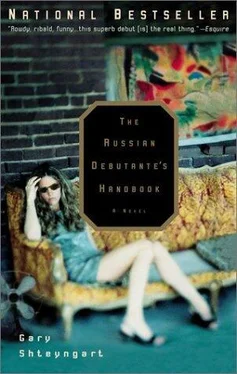Gary Shteyngart - The Russian Debutante's Handbook
Здесь есть возможность читать онлайн «Gary Shteyngart - The Russian Debutante's Handbook» весь текст электронной книги совершенно бесплатно (целиком полную версию без сокращений). В некоторых случаях можно слушать аудио, скачать через торрент в формате fb2 и присутствует краткое содержание. Город: New York, Год выпуска: 2003, ISBN: 2003, Издательство: Riverhead Books, Жанр: Современная проза, Юмористическая проза, на английском языке. Описание произведения, (предисловие) а так же отзывы посетителей доступны на портале библиотеки ЛибКат.
- Название:The Russian Debutante's Handbook
- Автор:
- Издательство:Riverhead Books
- Жанр:
- Год:2003
- Город:New York
- ISBN:0-7865-4177-6
- Рейтинг книги:4 / 5. Голосов: 1
-
Избранное:Добавить в избранное
- Отзывы:
-
Ваша оценка:
- 80
- 1
- 2
- 3
- 4
- 5
The Russian Debutante's Handbook: краткое содержание, описание и аннотация
Предлагаем к чтению аннотацию, описание, краткое содержание или предисловие (зависит от того, что написал сам автор книги «The Russian Debutante's Handbook»). Если вы не нашли необходимую информацию о книге — напишите в комментариях, мы постараемся отыскать её.
and
. The Russian Debutante’s Handbook Bursting with wit, humor, and rare insight,
is both a highly imaginative romp and a serious exploration of what it means to be an immigrant in America.
The Russian Debutante's Handbook — читать онлайн бесплатно полную книгу (весь текст) целиком
Ниже представлен текст книги, разбитый по страницам. Система сохранения места последней прочитанной страницы, позволяет с удобством читать онлайн бесплатно книгу «The Russian Debutante's Handbook», без необходимости каждый раз заново искать на чём Вы остановились. Поставьте закладку, и сможете в любой момент перейти на страницу, на которой закончили чтение.
Интервал:
Закладка:
But a few hours later he would already be on the other side, the low-rent side of the planet, recovering, reconnoitering, thinking of pyramid schemes and rich Americans scarfing down pork and cabbage beneath a topcoat of Mittel Europa mist…
Thinking of getting in good.
PART IV
PRAVA, REPUBLIKA STOLOVAYA, 1993
18. THE REPATRIATION OF VLADIMIR GIRSHKIN
THIRTEEN YEARS BEFORE,on the way from one jerry-built life to another, from the grim, disorganized airport in Leningrad with its faintly fecal odor and the toxic-sweet stench of Soviet detergent on the ground to the grim, organized one in New York where PanAm jumbo jets sat by departure gates like patient whales, Vladimir Girshkin had done the unthinkable and wept. It was the kind of outburst his father had prohibited at the conclusion of toilet training, on the grounds that there were few things left in the world that separated the sexes, but tears and sniffling certainly headlined the list. On that pug-nosed Aeroflot liner, trapped between rows of American tourists playing tea time with their hard-currency samovars and discovering the pleasant reductive logic of the Russian nesting doll, a livid Dr. Girshkin, surely comical-looking to the Westerners around him in his torn leather parka and ruined horn-rimmed glasses (both victims of last-minute violence at the hands of his wife), grabbed his son by the collar and ordered him to the lavatory to complete his whimpering.
As the older Vladimir now sat in a similar aluminum loo thousands of meters above Germany, his jeans around his ankles, his flowing nose in a towelette, his thoughts easily came around to his earlier bout of transatlantic despair: the customs hall in Pulkovo Airport, Leningrad, the spring of 1980.
It was only on the night before the Girshkins’ departure that the strange truth had finally been revealed to Vladimir: The family would not be taking the train down to their hutlike dacha in Yalta as had been promised; instead, they were to fly to a secret place, its very name unmentionable. A secret place! An unmentionable name! A-a! Small Vladimir was soon hopping about the apartment, jumping from suitcase to suitcase, making a fort out of the closet using his heavy galoshes as battlements, nearly precipitating an asthma attack through his adolescent rampage. Mother restricted him to the living-room couch, which smelled of childhood sweat and served as his bed come ten o’clock, but Vladimir would not be so easily restrained. He grabbed Yuri the Giraffe, the stuffed war hero whose spotted chest was pinned down with Grandfather’s Great Patriotic War medals, and threw the rattling creature up against the ceiling until the perennially unhappy Georgians in the flat above began stomping for quiet. “Where are we going, Mama?” Vladimir shouted (back then she was still known to him informally as Mama). “I’ll find it on the map for you!”
And Mother, paranoid that her easily excitable son might spill their destination to the neighbors, only said, “Far.”
And Vladimir, jumping through the air, said, “Moscow?”
And Mother said, “Farther.”
And Vladimir, jumping still higher, said, “Tashkent?”
And she said, “Farther.”
And Vladimir, now reaching nearly the same height as his flying giraffe, said, “Siberia?” Because that’s as far as it got, and Mother said that no, it was even farther than that. Vladimir spread out his beloved maps and traced his finger farther than Siberia, but it wasn’t even the Soviet Union out there. It was something else. Another country! But nobody ever went to another country. And so Vladimir spent the night running around the flat with volumes of the Great Soviet Encyclopedia under his arm, screaming in alphabetical order, “Afghanistan, Albania, Algeria, Argentina, Austria, Bermuda…”
It was the next day at customs, however, that the Girshkins’ departure took a turn for the worse. The well-fed men of the Interior Ministry in their tight polyester uniforms, now completely without reason for concealing their hatred for the soon-to-be ex-Soviet family before them, obliterated their luggage, tearing apart the wide-collared Finnish shirts and the few passable business suits smuggled through the Baltics, clothes which Vladimir’s parents had hoped would last them through their first interviews in New York. This was done ostensibly to find any hidden gold or diamonds that exceeded the minuscule amount allowed to leave the country. As they tore through Mother’s address book, shredding anything with an American address, including her Newark cousin’s instructions on how to get to Macy’s, a particularly large gentleman, whom Vladimir would never forget as having had a mouth frighteningly empty of teeth (even the silver kind that were standard issue to middle-aged Warsaw Pact citizens) and a strong smell of sturgeon on his breath, said to her: “You’ll be back, Yid.”
The agent had proved to be rather prescient, for after the Soviet Union collapsed Mother did return on several occasions to buy up a few choice pieces of the former empire for her corporation, but at the time all that occurred to Vladimir was that Mother—the bulwark against the storm outside the window, the woman whose word was the law of the household, from whose hands could come either a mustard compress that would torture through the night or a glossy volume on the Battle of Stalingrad that would be moored by his bedside for a year—was a Yid. Granted he had been called a Yid before; in fact, he had been called that every time his health allowed him a foray into the gray world of Soviet education. Yet he had always thought of himself as being the most thorough of Yids—small, stooped, sickly, and with a book regularly by his side. But how could anyone say that of Mother who not only read to Vladimir about the Battle of Stalingrad but looked ready to wage it all by herself.
And to Vladimir’s surprise, as the pages of her address book scattered about her and as the customs agents roared in appreciation of Comrade Sturgeon-Breath, Mother did nothing but twist the strings of her little leather purse around her whitened hand, while Dr. Girshkin, avoiding the frightened gaze of his son, made slight and ambiguous gestures toward the departure gate and their escape.
Then, before he knew it, they were buckled in, snow-covered, gas-streaked Russia rolling beneath the airplane’s wings, and only then did Vladimir allow himself the luxury, the necessity, of crying.
Now, thirteen years hence, with the jet headed in the opposite direction, Vladimir felt the intervening years effortlessly collapsing into a meaningless interlude. He was the same little Volodechka with the Yid last name, with the eyes puffed from crying and the nose wet from running. Only this time destiny wasn’t a Hebrew school carefully landscaped into a sylvan Scarsdale lot followed by a progressive Midwestern college. This time around, destiny was a gangster named after a fuzzy marmot.
And this time there would be no room for those silly mistakes—those slips of the amateur assimilationist—that had nearly cost him his life a week ago in a fading Floridian hotel room with that loose-fleshed naked old man; those brief bouts of idiocy and self-victimization that had put him on this Lufthansa flight fleeing New York and his imperious Francesca in disgrace. They belonged to an earlier Vladimir, a sweet and transparent one for whom the world had little use.
There was a knock on the bathroom door. Vladimir wiped his face, stuffed his pockets full of emergency tissue, and headed out past the rows of grumbling retired Virginians on a group tour waiting for the facilities, some with their cameras slung around their necks as if in preparation for that wayward Kodak moment en route to the crapper. He resumed his seat next to the window. The plane was riding over a patched carpet of thin, feathery clouds, a sign, his father had taught him over one country breakfast at the dacha, of an impending change in weather.
Читать дальшеИнтервал:
Закладка:
Похожие книги на «The Russian Debutante's Handbook»
Представляем Вашему вниманию похожие книги на «The Russian Debutante's Handbook» списком для выбора. Мы отобрали схожую по названию и смыслу литературу в надежде предоставить читателям больше вариантов отыскать новые, интересные, ещё непрочитанные произведения.
Обсуждение, отзывы о книге «The Russian Debutante's Handbook» и просто собственные мнения читателей. Оставьте ваши комментарии, напишите, что Вы думаете о произведении, его смысле или главных героях. Укажите что конкретно понравилось, а что нет, и почему Вы так считаете.












